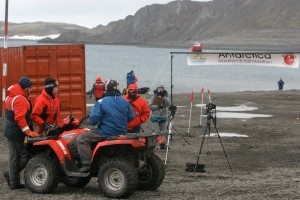The stark, cold and sometimes windy backdrop gives a dramatic and surreal atmosphere to one of the harshest of marathons, the ninth Antarctica Marathon and Half Marathon. To draw comparisons with the Comrades Marathon, on the surface may seem a little obscure. Where there are thronging masses at the start, music blaring, masses pressing, here there are none. At the Russian base the start is kept deliberately small. This is responsibly done by the organisers with careful consideration to the race’s ecological impact on Antarctica’s pristine conditions. No more than a hundred people may gather at a location at any one time. No two marathons could be more different than Comrades and Antarctica.

But look under the surface, peel away space and time. Strip down running to the bare essentials, and the questions asked here at the end of the earth are the same ones asked in the heat of the Valley of a Thousand Hills. The human enquiry on the Collins Glacier is no more searching than it is on the Inchanga Bank. Each race demands your answer to a simple question, – what sort of person are you anyway? The spirit of endurance will meet its defining moment in each race.
The sheer scale of both marathons makes the simple and even the mediocre a heroic act. For every competitor right to the very last brave soul home is supported and admired. From the winner to the final gun at the cut-off, joggers become runners, runners become athletes, and mortals become gods. People become heroes.
In both races there lies a soft call, a feint and subtle echo of ancient heroes as their ghosts look on with benign satisfaction. The fallen of the Great War give courageous passage to those who toil up Africa’s mighty hills. In the white void, the firm and yet gentle hands of Shackleton, Amundson and Scott are on my shoulder. Courage is sustained by unseen forces. The ancients are well pleased with my performance on this day.
Two South Africans, Charles Stewart and Dimitrios Kavallineas, both running their seventh marathon on the seventh and final continent discovered that camaraderie, so commonplace in the Comrades Marathon followed them to the ends of the Earth. Even on the barren lands in Bellingshausen, that special spirit endures.

For Charles it came with a cold and sharp crack as he lost his footing on Collins and hit his head with such force that he sustained a concussion. Hardly five kilometres into the race and it all seemed over. Two years on the waiting list, hard and earnest training, often gingerly nursing injuries all the while. It all came crashing down on the hard ice. Mercifully a Russian doctor from the base was on hand, and confirmed that Charles was hurt. He did have a concussion but, if he ran – while it may be with great difficulty, he would not sustain any permanent injury. One thing would be certain, it would be a battle, and he could not do it alone. Charles dimly looked at fellow Phobians club mate Dimitri. Like a heavy Antarctic fog, the question hung in that silent cold.
Dimitri did not hesitate the call. His Antarctic race would be shaped by the very spirit that shaped his eight Comrades runs. Vic Clapham heard it so long ago when he started that great race. Kavallineas’ answer was clear as he patiently, unselfishly steered his Phobians brother to the finish line. “Watch your footing, Charles. This way – not far to go now. I will look after you”

Their time was an unflattering 06:39:52. By the time they made their safe and heroic finish the wind was up and the sleet was beginning to sting the cheeks, the gloom of night gathering.
This tableau could not be farther removed from the thronging mass, the noise and the excitement that makes up so much of the finish Comrades Marathon. Yet in those silent places where runners go to test their spirit, the race in the southernmost part of the world is no different to the one in Africa’s green hills. In both we are comrades, in both we are heroes.
The South Africans acquitted themselves well on that day in March. In both the events nine finished. Top honours must go to Fillippo Faralla who took second place overall. This is achievement in itself, what does make his run remarkable is that in so doing, he also broke the previous course record.
Other South Africans who had the privilege of joining with the great explorer spirit were Paul Leslie-Smith formally of Natal, now working in Boston, Pat Crawley, wife of Comrades icon Clive Crawley. She finished with Patricia Collins, both from Underberg. Together they are responsible for organising the Sani Stagger. Jaqui Hadingham of Durban. The half marathon records Andries Lubbe from Strand and myself as finishers.

Somehow Antarctica demands our attention, a frozen continent so far removed from our imagination. It is a place that will test our human resolve in so many ways. I am glad that I went to that place and was part of this intriguing race.
“I do not regret this journey…We bow to the will of Providence, determined still to do our best to the last” – Robert Falcon Scott.

You must be logged in to post a comment.